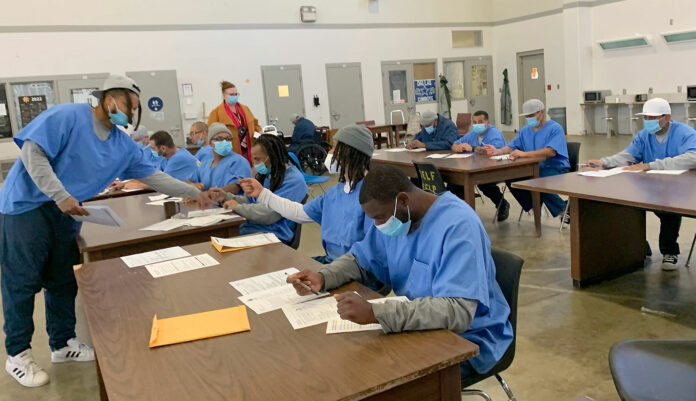
SALINAS VALLEY — Hartnell College will use a three-year, $480,000 grant from the California Community Colleges (CCC) system to ensure that more incarcerated students not only complete college courses, but also earn a degree and continue their education.
The grant, effective July 1, is part of $10 million awarded to 59 colleges in the CCC’s Rising Scholars Network, funded by Assembly Bill 417. The statewide program serves almost 20,000 justice-involved students both on campus and in prisons, jails and detention centers.
The initiative’s objective is to increase the number of incarcerated students who complete a degree, as well as help them earn college credentials more efficiently, with fewer total credits. The overall goal is to help students lead productive lives once they leave prison and reduce the number who end up returning, said Ana Gonzalez, who directs the Rising Scholars program at Hartnell.
“We want to get students through the finish line — to be able to say, ‘OK, you’re ready for graduation, or you’re missing this one class,’” Gonzalez said.
Erica Padilla-Chavez, president of the Hartnell Community College District Governing Board, said the Rising Scholars grant will support the college’s mission of removing obstacles to student success, particularly for those who have traditionally been underrepresented in higher education.
“This is one more way that we provide access to the tremendous benefits of education,” Padilla-Chavez said. “Just as with our traditional students, we know these services can change the lives of incarcerated students and their families, while benefiting all of society.”
Hartnell began offering classes for incarcerated students in 2016 following passage of Senate Bill 1391, which allows community colleges to receive funding for incarcerated students. Hartnell now serves about 800 students in 25 course sections at the Correctional Training Facility (CTF) and the Salinas Valley State Prison, both near Soledad, and at the Monterey County Jail and Monterey County Detention Center, both in Salinas.
So far, however, only one student has completed a degree. In 2020, Casey Brown became Hartnell’s first Rising Scholars graduate, earning his associate degree in general studies at CTF.
Hartnell will use the funds to provide increased counseling services for incarcerated students, helping them determine what they need to complete a degree and guiding them to complete those courses. In addition to paying for an additional part-time counselor, the grant will replace funding that now comes from a Student Equity Fund.
Completing a degree is one of several reasons incarcerated students embrace the opportunity to take college courses, Gonzalez said.
Inmates can receive time off their sentences for completing courses and earning credentials, as well as gain a sense of accomplishment and set a positive example for their children and other family members, she said.
Taking college classes while in prison also gives students a place where they can temporarily shed the inmate label and instead take on the identity of student.
“It offers them that mental space for them to be able to have a dialogue, to agree and disagree and to be treated as a student and not as an inmate, so that is highly valued,” Gonzalez said.
Article submitted by Scott Faust, Communications Director for Hartnell College.














